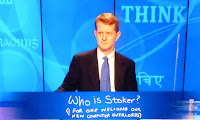One of the challenges with writing is that it’s something you can only learn by doing. You can take classes, read books, and study examples, but at the end of the day the only way to improve your writing is to write. I’m not saying all that other stuff is bad, but remember my single, simple rule—find what works for you.
As you study the act of writing more and more, you’ll begin to discover countless hints, tips, and tricks. Each one has its own faithful followers, and some of these folks will swear by three or four more of these ideas. After awhile, you’ll find a large number of people fall into one of two camps.
First, there are those who think of writing as a mechanical process. They’ve broken it down to a hard, cold science with no talent or experience needed. There are set moments and beats and page counts and pacing and all of that. All paragraphs are three sentences minimum, seven maximum. Scenes are never longer than two pages. Introduce your main character by page six, and your first plot point by page eleven. Your conflict by page nine. Your antagonist by page fifteen. Action begins on twenty with a major turning point on page fifty-three. These are the folks who will quote Syd Field to point out the flaws in your screenplay, or use the MLA Handbook to explain why your novel will never be published.
These folks, by and large, are wrong.
At the extreme other end of this are the folks who think none of this matters. They’re the ones who broke the rules, tossed the guidebook out the window, and still roared past the finish line. Kevin Smith. Diablo Cody. Cormac McCarthy. Robert Rodriguez. These writers started from scratch, winged it, and came out on top. And, of course, they’ve got legions of students and online fans who all say “Well, if they did it, of course I can…” Page counts don’t matter. Formatting doesn’t matter. Spelling and punctuation don’t matter. What matters– the only thing that matters– is the pure, raw creative genius and letting it shine through, because that’s what people will see on the page and that’s what always matters. If you constrict yourself in any way with rules or guidelines, you’re just hampering your muse and diluting your talent.
These people are also wrong.
I’ve been lucky enough to attend conferences twice now where I got to listen to a very well-spoken agent by the name of Esmond Harmsworth. He gave a wonderful little talk the first time I saw him on ten rules for writing a mystery novel, and he set down some basic commonalities that all such stories have as far as location, characters, and complexity. What was even more interesting, though, was when he started talking about breaking these rules.
You see, if you follow every single rule for writing a mystery novel, a screenplay, or even a blog post, you’re following a formula. As in, a formula story. It’s where anyone with the slightest bit of experience can predict X, Y, and Z when all they’ve seen so far is A, B, and C. If you’ve watched a movie or television show where you can immediately guess who the murderer is, who the girl’s going to end up with, or how Captain Scarlet’s going to stop the missile launch, it’s probably because the writers are following a formula.
Now, that being said, you’ll notice there’s a lot of formula stuff out there. Formula is not necessarily bad. It’s the foundation and the ID card of every genre, and it’s the common thread that lets all of us access material. Hundreds of writers make really good livings writing novels, television shows, and movies that follow a formula.
Am I saying all formula is good? No.
Every now and then something comes along that breaks all the rules, twists every expectation, and is still magnificent. The novel (if it can be called such) House of Leaves is a prime example. Trying to even define that book is a whole separate post. It’s got a cult following and has been a bestseller in several countries (and several languages) for the past decade.
Does that mean any writer can do whateve they want? Nope. Especially not an unpublished, unproduced writer.
As a writer, you need to know what rules you need to follow and which ones you can get away with breaking. Which means you actually need to know what the rules are and how you’re breaking them. Study your chosen format. Study your chosen genre. Be aware that if you’re going to break a rule, you need a reason, and it can’t just be “because I felt like it.”
The vast majority of the stories you read will follow most of the basic guidelines for their form. The memorable ones will break a rule or two. The truly spectacular ones will break three or four. And in very, very, very rare– exceptionally rare– cases some writers may get away with shattering the rules altogether. The real trick is knowing why and how.
And if you don’t know why and how, don’t assume you’re the exception to the rules.


